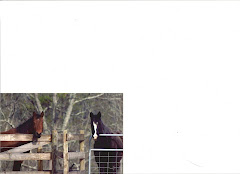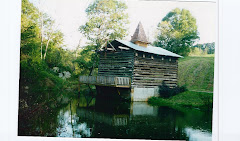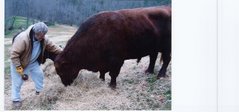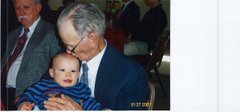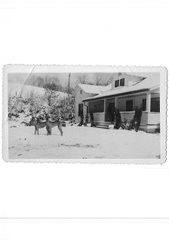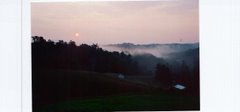We are continually borne by others. Therefore, willingly or unwillingly, we are perpetually in debt to God and to the whole creation. Mary Shiedler
I was miserable... lonely and lost, in Louisville. We had moved from a place I loved dearly and Michael was immersed in his new job as a professor at the seminary. He was starting a new center for family ministry as well as teaching. His days were filled with meaningful work and travel. I was at home with three children, one of whom was a depressed and angry teen. Our home was lovely, our neighborhood was full of nice people and lots of children, we rejoined the church where we met and were married, I volunteered in the schools, worked in the church, did part time work, went to therapy to work on my mixed up self and still felt lonely.
Michael was feeling lonely, too, so as a present for him, I gave him a Brotherhood. I called a group of men together at our house for an evening of food, fun and fellowship. I introduced the evening, served the food and then said, “You are on your own. If you want to keep this going, plan it yourselves.” They did. All the time we lived in Louisville, they met every month at the same restaurant (the same one frequented by Thomas Merton) creating the ties that bind and sustain.
I created a Ladies Aid for myself... five women whom I had known for years, some better than others. We were dedicated to eating in every restaurant on Bardstown Road at least once. Over shared meals, soaking in Eleanor’s hot tub one snowy evening, sharing the bread and wine of true communion, we shared one another’s burdens. One in our group was a widow trying to find her way back to a new kind of life. One was a contemporary gospel music performer who had moved to Louisville so her husband could teach at the seminary. Another was a professor at the medical school and a social worker rounded out the lot of us. Three of us had children still at home. All of us were members of the same church. Two of us were married on the same day, years apart. None of us had a perfect life and all of us had burdens we were bearing. It took awhile for the shields to drop but when they did, it was a relief to discover someone was standing beside us helping to hold us up.
Yesterday was my birthday and I gave myself the present of another Ladies Aid. Last night we met at a local restaurant in West Asheville. Gathered around the table, we began the getting to know you dance. We have known each other for years but not on a regular basis. The Vermont Rules were our guiding light... no talking about work, children, money or parents after the first ten minutes. Once members of the same church, we are now scattered with some still at the same church where we met. It doesn’t matter. What I need is a place to be with women who matter to me and to whom I matter. I don’t know how this group will come together. Maybe a few more will join and a few will drop out. Over the long haul, with the passage of time, a center will emerge and will hold us together like the gravity that plants our feet on the ground. Our roots will sink deep into one another’s lives and our branches will intertwine holding us up during storms.
One of my daughters has her version of a Ladies Aid group in her church. They came to the farm for a weekend retreat recently. I loved listening to them laugh, tell church stories, talk about their lives and watched as they took a break from their work-a-day worlds together. They go to movies, take road trips, eat out, work together, care for one another’s children and live their lives knowing there is a group of friends who will drop everything to come to their aid.
We are continually borne by others even if we appear to be self sufficient. Our outward selves rarely reflect the whole of who we are underneath. Only when we are in a safe place, a place where we know we loved no matter what, can we find traces of God as we let our masks drop to the floor, revealing the terrible awful wonder and need of being fully human. It is a gift and a crucifixion all bound up together. Listening and loving one who is different from me, who makes choices I would not make, who struggles with life situations that are foreign to me, trying to hear the soul speaking through the mouth of the woman who sits at my table not just the words... this is the hard work of being Christian, called to love others as I love God and myself. And if I show up, make myself available, do the work, I will find love and life and laughter in abundance as I am freed and free others to become their own true creation.
We are meeting again in two weeks to help Mary Beth put her Christmas Village (metropolis, actually) together for the holidays. We may try her crustless pizza recipe for our communion meal.Holler if you want to come.
Thursday, October 29, 2009
Tuesday, October 27, 2009
Many are called, many are chosen.
Do not be too moral. You may cheat yourself out of too much life. Aim above morality. Be not simply good, be good for something. Henry David Thoreau
Living on a farm requires everyone in the farm family to work. As a child, it was expected of me to help with the garden planting, hoeing, picking and preserving. When it was hay season, I was on the trailer stacking bales and helping to transfer those same bales to the pole barn for storage. When a new pasture was needed, my sister and I spent five of our Saturdays sprigging and watering grass with our father. Driving the tractor while my dad peeled hay off the roll for the cows, washing the clothes and hanging them out on the line in the backyard, learning how to shoot a rifle so I could kill a rattlesnake (we lived on a farm that had previously been named Rattlesnake Hill for good reason), bucket feeding orphaned calves twice a day, feeding and watering the chickens were a part of my daily life as a child in the rural South. When my mother went to work outside the home when I was nine, daddy gave my sister and me two cooking lessons... how to make vegetable soup and how to cut up a chicken (you could only buy whole chickens back in the dark ages). After that, we were on our own and required to help start supper for mama before she got home. Often we had the meal ready by the time she arrived. This work was in addition to the usual chores... make your bed, clean your room, practice your piano, do your homework, help with the housework on Saturday mornings, iron clothes. Children in all the families I knew were good for something besides just being.
Barbara Brown Taylor in her book An Altar in the World lists all the jobs she has had and all the jobs she hopes to yet have. She chooses to see them as opportunities to learn about herself and connection to other people she would not meet except through that job. Like most of us, she lived with the illusion that God had one overarching most important just right job waiting for us when we grew up.
In my Baptist world, this was referred to as “being called”. A popular folk saying was “Many are called but few are chosen”.Working at the paper mill was o.k. but being called to be a preacher was much higher on the list of godly work. Being a teacher was good work but being a missionary was the pinnacle of sacrificial calling. Listening to Miss Pearl Todd tell of her work as a missionary in China elicited in my twelve year old self an earnest desire to be called to full time Christian service. I claimed that call by walking down the aisle and announcing it to the preacher, Brother Kannon, who promptly told the congregation. In later years my father owned his fear of that call coming true when I married Michael in seminary. He figured God was finally going to get me and send me to “Darkest Africa” far, far away from him and the family.
The truth of the matter is we are all called to and chosen for many different kinds of work in our lives. My daddy worked in a paper mill, his college degree prepared him for a work he chose not to do, in order to buy the farm, work that he loved to do. My mother loved working in the insurance business but was never paid what she was worth. I’ve been a social worker, a paid child care provider, a piano teacher, director of an Information and Referral Service, an office assistant for a fund raising effort, an organist, a picture framer and a teacher in a continuing ed program. None of this work was all of who I was but each job taught me something new about myself.
Most of us have two kinds of work... work we have to do and work we choose to do. Sometimes the work we have to do keeps food on the table and a roof over our heads, the dishes washed and the house cleaned. The work we choose to do keeps our souls fed and sheltered. Even those lucky few who have work that supplies both needs, will find worms in their shiny red work apples. The work we do, both kinds, is a gift we offer to the world not because it makes us somebody but because we are already somebody, a special gift from God to the world.
I mother my children and other young friends as one of my vocations. It is as special to me as the art I create and the classes I teach. The horse poop I scoop and the hay I feed the cows is have to work that offers me an opportunity to rest my spirit in the needs of the present day. Shopping for groceries, washing clothes, cooking supper and mopping the floor become sacramental acts, offerings of grace filled joy because I have been given much. In Ecclesiastes, the preacher says, “Enjoy life with the wife whom you love...all the days of your life which have been given to you under the sun... and in your work at which you work under the sun. Whatsoever your hand finds to do, do it with all your might.”
And so today, Lord, help me do what needs to be done and what I choose to do with all my might, not from any sense of unworthiness, but in the gladsome assurance that all I do is a gift from you that I am giving back to you. I am a somebody, a whobody, an employee whose paycheck is love, laughter and life. Thank you for all my jobs, great and small.
Living on a farm requires everyone in the farm family to work. As a child, it was expected of me to help with the garden planting, hoeing, picking and preserving. When it was hay season, I was on the trailer stacking bales and helping to transfer those same bales to the pole barn for storage. When a new pasture was needed, my sister and I spent five of our Saturdays sprigging and watering grass with our father. Driving the tractor while my dad peeled hay off the roll for the cows, washing the clothes and hanging them out on the line in the backyard, learning how to shoot a rifle so I could kill a rattlesnake (we lived on a farm that had previously been named Rattlesnake Hill for good reason), bucket feeding orphaned calves twice a day, feeding and watering the chickens were a part of my daily life as a child in the rural South. When my mother went to work outside the home when I was nine, daddy gave my sister and me two cooking lessons... how to make vegetable soup and how to cut up a chicken (you could only buy whole chickens back in the dark ages). After that, we were on our own and required to help start supper for mama before she got home. Often we had the meal ready by the time she arrived. This work was in addition to the usual chores... make your bed, clean your room, practice your piano, do your homework, help with the housework on Saturday mornings, iron clothes. Children in all the families I knew were good for something besides just being.
Barbara Brown Taylor in her book An Altar in the World lists all the jobs she has had and all the jobs she hopes to yet have. She chooses to see them as opportunities to learn about herself and connection to other people she would not meet except through that job. Like most of us, she lived with the illusion that God had one overarching most important just right job waiting for us when we grew up.
In my Baptist world, this was referred to as “being called”. A popular folk saying was “Many are called but few are chosen”.Working at the paper mill was o.k. but being called to be a preacher was much higher on the list of godly work. Being a teacher was good work but being a missionary was the pinnacle of sacrificial calling. Listening to Miss Pearl Todd tell of her work as a missionary in China elicited in my twelve year old self an earnest desire to be called to full time Christian service. I claimed that call by walking down the aisle and announcing it to the preacher, Brother Kannon, who promptly told the congregation. In later years my father owned his fear of that call coming true when I married Michael in seminary. He figured God was finally going to get me and send me to “Darkest Africa” far, far away from him and the family.
The truth of the matter is we are all called to and chosen for many different kinds of work in our lives. My daddy worked in a paper mill, his college degree prepared him for a work he chose not to do, in order to buy the farm, work that he loved to do. My mother loved working in the insurance business but was never paid what she was worth. I’ve been a social worker, a paid child care provider, a piano teacher, director of an Information and Referral Service, an office assistant for a fund raising effort, an organist, a picture framer and a teacher in a continuing ed program. None of this work was all of who I was but each job taught me something new about myself.
Most of us have two kinds of work... work we have to do and work we choose to do. Sometimes the work we have to do keeps food on the table and a roof over our heads, the dishes washed and the house cleaned. The work we choose to do keeps our souls fed and sheltered. Even those lucky few who have work that supplies both needs, will find worms in their shiny red work apples. The work we do, both kinds, is a gift we offer to the world not because it makes us somebody but because we are already somebody, a special gift from God to the world.
I mother my children and other young friends as one of my vocations. It is as special to me as the art I create and the classes I teach. The horse poop I scoop and the hay I feed the cows is have to work that offers me an opportunity to rest my spirit in the needs of the present day. Shopping for groceries, washing clothes, cooking supper and mopping the floor become sacramental acts, offerings of grace filled joy because I have been given much. In Ecclesiastes, the preacher says, “Enjoy life with the wife whom you love...all the days of your life which have been given to you under the sun... and in your work at which you work under the sun. Whatsoever your hand finds to do, do it with all your might.”
And so today, Lord, help me do what needs to be done and what I choose to do with all my might, not from any sense of unworthiness, but in the gladsome assurance that all I do is a gift from you that I am giving back to you. I am a somebody, a whobody, an employee whose paycheck is love, laughter and life. Thank you for all my jobs, great and small.
Sunday, October 25, 2009
Good fences... good neighbors... good God
The minister’s group was sitting on the deck, warming their souls and their bodies in the fall sunshine, taking in the view and relaxed when I arrived. As I walked to the deck to greet them, Mahan made the mistake of asking me how I was. I was not good. The past thirty minutes had been spent fuming about hunters on the back part of the farm who ignored fences and posted signs in order to hunt deer. Leisa, our neighbor, had called me on my way home from work to tell me there was shooting on the farm. She offered to go check on the cows to make sure they were not hurt. As she walked into the Sound of Music hill pasture, she heard a big diesel pickup truck drive away. Hunters, using the old road that borders the back fence line of the farm perhaps, were leaving.
One of the early lessons I learned from my father was the importance of honoring fence lines. Growing up in a rented house on a farm owned by a friend and neighbor, we were instructed to ask permission when we roamed past the fence lines that enclosed the fields surrounding our house. When my pet pig broke through the fence line, we went to pick her up, apologizing for the inconvenience, loss of corn and fixed the fence. Boundaries matter in a rural setting. They help keep everything and everyone “in their place”. Poet Robert Frost in his poem “Mending Wall” says “Good fences make good neighbors”. Every farmer knows the truth of this statement. But, good fences make no nevermind if they are not honored by the persons on both sides of the fence.
Our donkeys nibble away at board fencing. Bit by bit, in boredom or just because it feels good, they chew small bits away until the board breaks. The two inch thick boards that separated them from Junie B in the stall are a memory. Now a metal gate will keep them and their busy teeth in check. Sometimes a fence, like the rock walls in Frost’s poem, is only as good as its construction.
Reading in Albion’s Seed, I find some of the ancestral bloodkin DNA memory that helps me understand my furious response to this invasion from the outlander, the foreigner, the one who does not belong. My Calhoun ancestors came from a lawless place where borders were routinely overrun with violence and hate. When they came to the New World, they brought with them a pattern of behavior and feeling that had formed through centuries of survival on the edge. Boundaries were a matter of life and death.
When I read of some of God’s encounters with my spiritual ancestors, I discover boundaries are important to God, too. Moses is told to take off his shoes because he is standing on holy ground. The Ten Commandments give us fences to help keep our behavior contained. The Beatitudes, the New Testament equivalent of the Ten Commandments, give us a different pattern for fence construction. And the ultimate boundary, the greatest commandment according to Jesus, was to love God and to love your neighbor as yourself.
These boundaries, these fences, are a matter of life and death. The fence lines are a guide to follow. I would wander afield, be lost and separated not only from my herd, but also from my Shepherd. Like the hunters, I would be a trespasser, a breaker of the law, one who by will-full choice, breaks through the fence lines God has set for me.
Sometimes I, like the donkeys, nibble my way through to what seems to be greener grass on the other side. Other times I make a mad heedless dash through the border seeking a perceived freedom that is not really free at all. I can hear my father’s voice saying, “Mind the fence lines, Peggy”. And, I hear God’s voice holding me to accountability for minding my own fence lines, keeping my ego centered self contained, while I learn to live with my limits. I am mortal. I am not Queen of All I Survey. I am not God.
I hope God is more merciful to me than I was to the hunters when I break the fence lines. It would not do for me to be in charge.
One of the early lessons I learned from my father was the importance of honoring fence lines. Growing up in a rented house on a farm owned by a friend and neighbor, we were instructed to ask permission when we roamed past the fence lines that enclosed the fields surrounding our house. When my pet pig broke through the fence line, we went to pick her up, apologizing for the inconvenience, loss of corn and fixed the fence. Boundaries matter in a rural setting. They help keep everything and everyone “in their place”. Poet Robert Frost in his poem “Mending Wall” says “Good fences make good neighbors”. Every farmer knows the truth of this statement. But, good fences make no nevermind if they are not honored by the persons on both sides of the fence.
Our donkeys nibble away at board fencing. Bit by bit, in boredom or just because it feels good, they chew small bits away until the board breaks. The two inch thick boards that separated them from Junie B in the stall are a memory. Now a metal gate will keep them and their busy teeth in check. Sometimes a fence, like the rock walls in Frost’s poem, is only as good as its construction.
Reading in Albion’s Seed, I find some of the ancestral bloodkin DNA memory that helps me understand my furious response to this invasion from the outlander, the foreigner, the one who does not belong. My Calhoun ancestors came from a lawless place where borders were routinely overrun with violence and hate. When they came to the New World, they brought with them a pattern of behavior and feeling that had formed through centuries of survival on the edge. Boundaries were a matter of life and death.
When I read of some of God’s encounters with my spiritual ancestors, I discover boundaries are important to God, too. Moses is told to take off his shoes because he is standing on holy ground. The Ten Commandments give us fences to help keep our behavior contained. The Beatitudes, the New Testament equivalent of the Ten Commandments, give us a different pattern for fence construction. And the ultimate boundary, the greatest commandment according to Jesus, was to love God and to love your neighbor as yourself.
These boundaries, these fences, are a matter of life and death. The fence lines are a guide to follow. I would wander afield, be lost and separated not only from my herd, but also from my Shepherd. Like the hunters, I would be a trespasser, a breaker of the law, one who by will-full choice, breaks through the fence lines God has set for me.
Sometimes I, like the donkeys, nibble my way through to what seems to be greener grass on the other side. Other times I make a mad heedless dash through the border seeking a perceived freedom that is not really free at all. I can hear my father’s voice saying, “Mind the fence lines, Peggy”. And, I hear God’s voice holding me to accountability for minding my own fence lines, keeping my ego centered self contained, while I learn to live with my limits. I am mortal. I am not Queen of All I Survey. I am not God.
I hope God is more merciful to me than I was to the hunters when I break the fence lines. It would not do for me to be in charge.
Subscribe to:
Comments (Atom)

